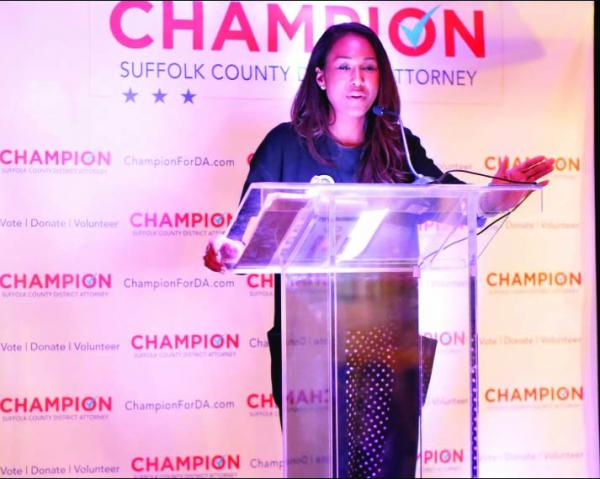April 19, 2018

Linda Champion spoke at her campaign launch event, held earlier this month at Cesaria’s restaurant in Dorchester. The Hyde Park resident, 44, has worked as a prosecutor in Suffolk County and as a real estate lawyer. She has joined a dynamic field of Democrats who hope to succeed DA Daniel Conley, who will not seek re-election this fall.
Photo courtesy Champion campaign
Linda Champion, who has worked as a prosecutor and a real estate lawyer, is seeking the Suffolk County District Attorney post to refocus the office’s resources on prosecuting violent crimes and financial misdeeds while advocating for leniency around younger offenders.
The Newbury College night school grad who went on to earn degrees at Suffolk University and its law school cites her hardscrabble youth and experience working in the juvenile court system as formative. She is also in line with other potential candidates for the post in arguing for better redirection before teens end up in the criminal justice system.
In an interview with the Reporter at Caffe Zia Gianna, the 44-year-old Champion, a Texas native, recalled her childhood in the south as the daughter of African-American and Korean parents. As she moved between homes, with and without family watching out for her, she watched an uncle struggle with heroin and girls her age end up wayward, pregnant, or disillusioned. But for a supportive grandmother, Champion said, she could have been like those girls.
She knows hardship, she says, adding that changes as small as the Chelsea chief of police’s strategy of calling youthful offenders “juvenile candidates” can have an impact. “If we keep labeling people in particular ways, then it gives people listening the feeling that the person is bad, or that person is not on the right path, when in fact all they need is redirection,” Champion said.
The Hyde Park resident joins a substantial field looking to succeed District Attorney Dan Conley, who will not seek re-election to the office he has held for 16 years. Four other Democrats are openly running – state Rep. Evandro Carvalho, former defense attorney Shannon McAuliffe, former MBTA legal counsel Rachael Rollins, and former Suffolk gang unit chief Greg Henning. John Carey, a maritime attorney in Charlestown, pulled papers this week to run as a Democrat, according to the Secretary of the Commonwealth’s office.
The Brockton lawyer and entrepreneur Mike Maloney also joined the race last week, initially as a Republican but now as a non-party candidate. All candidates need to secure 1,000 signatures by May 1 to qualify for the ballot.
Champion said a case she tried as a prosecutor, in which a student sliced another student’s ponytail off at the root of the hair with a knife in class, had “the most profound impact on my life.” The girl’s immigrant mother came to the States very young, Champion said, and was forced to use drugs by her husband, maintaining her habit by sexually trading her young children to men. “So now I have to ask myself the question: What do I do when I have a youthful offender who is acting in a way that has hurt someone else, but they themselves are victims?”
Another area where the law needs particular leniency is with those suffering from addiction, she said. Substance abuse does not exist in a vacuum, she noted, and may exist alongside criminal behavior as addicts need money to keep feeding their habits.
“These are just people who have found themselves in a situation,” she said. “Their life is in crisis, and they are coping with substance abuse, and we need to figure out pathways that they can now come back, fix the problems that are going on in their life, remove the dependence that they have upon the substance, and put them on a pathway to recovery.”
Champion, saying there is room to consider decriminalizing drugs like cocaine, added that she wants to shift focus from “petty larcenies” or drug offenses toward economic crimes and violent crimes, the latter of which already makes up a substantial portion of the office’s workload.
Programs in schools can help identify triggers or stressors in young people before they enter the criminal justice system, Champion said, as long as the resources are there for teachers or other trusted adults to step in.
Her interest in financial crimes began nine years ago, at the start of the financial collapse, when the Board of Bar Overseers publicly reprimanded her for not following the proper procedures in handling funds related to a real estate transaction in 2007 when a lender went bankrupt. The board’s action caused “a financial crisis for me and my company, but I dealt with it,” she said. “They said it’s not criminal, it’s civil; but it felt like a crime to me.”
She then went to work for Conley, handling cases in juvenile court and lower-level courts in Roxbury and Dorchester before moving up to the Superior Court. She worked for Conley from May 2011 through August 2013, according to his office.
“There’s a lot going on now in society,” she said. “There’s a lot that I see, a lot that I hear, a lot that I bear witness to. And one of the things that I can do, if I can take my legal experience, my training, my background, my passion for helping people, is bring that all together and make an impact on the way that we apply laws to people.”
Material from the State House News Service was used in this report.



